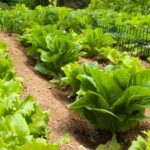Are pressure treated landscape timbers safe for vegetable gardens? This is a common question among gardeners looking for the best materials to use for their vegetable garden borders. In this article, we will explore the topic of pressure treated landscape timbers and whether they are safe to use in vegetable gardens. We will discuss the chemicals used in pressure treated timbers, potential risks, alternative options, and provide tips for safely using these materials in your garden.
Pressure treated landscape timbers are a popular choice for garden borders due to their durability and resistance to rot and insects. However, there are concerns about the safety of using pressure treated timbers in vegetable gardens, as they are treated with chemicals that could potentially leach into the soil and affect plant growth.
In the following sections, we will delve into what exactly pressure treated landscape timbers are, the common concerns surrounding their use in vegetable gardens, the chemicals used in pressure treated timbers, potential risks of using these materials, alternative options for vegetable garden borders, and tips for safely using pressure treated timbers in your vegetable garden.
What Are Pressure Treated Landscape Timbers?
Pressure treated landscape timbers are a popular choice for building borders and retaining walls in outdoor spaces, including vegetable gardens. These timbers are designed to resist rot, decay, and insect damage, making them a durable option for landscaping projects. They are often made from softwoods such as pine or fir that have been treated with chemicals to increase their lifespan.
The treatment process involves immersing the timbers in a liquid preservative solution under high pressure, allowing the chemicals to penetrate deep into the wood fibers. This helps to protect the timbers from deterioration caused by exposure to moisture and soil. As a result, pressure treated landscape timbers are commonly used in outdoor construction projects where they may come into contact with the ground.
However, some gardeners and homeowners have expressed concerns about the safety of using pressure treated timbers in vegetable gardens. The chemicals used in the treatment process can leach out of the wood over time and potentially contaminate the soil, posing potential risks to edible plants. As a result, many people wonder whether pressure treated landscape timbers are safe for use in vegetable gardens.
Despite these concerns, pressure treated landscape timbers can be safely used in vegetable gardens with proper precautions. By understanding the chemicals used in treatment and taking steps to minimize any potential risks, gardeners can make informed decisions about using pressure treated timbers for their garden borders while still prioritizing safety and environmental impact.
| Concerns About Pressure Treated Timbers | Potential Risks |
|---|---|
| Chemicals can leach into soil | Contamination of edible plants |
| Risk of exposure when handling | Impact on soil ecology |
Common Concerns About Pressure Treated Timbers in Vegetable Gardens
Pressure treated landscape timbers have become a popular choice for garden borders due to their durability and resistance to decay. However, many gardeners have expressed concerns about the safety of using pressure treated timbers in vegetable gardens. This section will address some of the common concerns and questions regarding the use of pressure treated timbers in vegetable gardens.
Leaching of Chemicals
One of the primary concerns about using pressure treated timbers in vegetable gardens is the potential leaching of harmful chemicals into the soil. Pressure treated timbers are infused with chemical preservatives such as arsenic, chromium, and copper, which can potentially leach into the surrounding soil. This raises concerns about the safety of consuming vegetables grown in close proximity to these timbers.
Impact on Soil and Plants
Gardeners are also worried about the potential impact of pressure treated timbers on soil quality and plant health. Some studies suggest that certain chemicals used in pressure treatment can negatively affect soil microorganisms and plant growth. This has led to apprehension about the long-term effects on the overall health and productivity of a vegetable garden.
Risk of Exposure
Another concern is the risk of direct exposure to these chemicals during the installation and maintenance of pressure treated timber borders. Gardeners may come into contact with these chemicals through handling or splintering of the timbers, raising questions about potential health risks associated with repeated exposure.
Given these common concerns about using pressure treated landscape timbers in vegetable gardens, it is essential for gardeners to consider alternative options for constructing garden borders that prioritize safety and sustainability. While there are ways to mitigate some risks associated with using pressure treated timbers, it is important for gardeners to make informed decisions based on their specific circumstances and priorities.
The Chemicals Used in Pressure Treated Timbers
Pressure treated timbers are often used in landscaping and construction due to their durability and resistance to rot, decay, and insect damage. However, there is a growing concern about the safety of using pressure treated landscape timbers in vegetable gardens. This concern stems from the chemicals that are used in the pressure treating process.
The most common chemicals used in pressure treated timbers are chromated copper arsenate (CCA), alkaline copper quaternary (ACQ), and copper azole. These chemicals are effective at protecting the wood from deterioration caused by moisture and insects. However, they also contain harmful substances such as arsenic, chromium, and copper which can potentially leach into the soil and be absorbed by plants.
Research has shown that these chemicals can pose health risks when they come into contact with skin or when they are ingested, particularly for young children. The Environmental Protection Agency (EPA) has classified these substances as potential carcinogens. As a result, many gardeners are hesitant to use pressure treated timbers in their vegetable gardens, especially if they plan to grow edible crops.
Despite these concerns about the chemicals used in pressure treated timbers, there are ways to minimize the potential risks when using them in vegetable gardens. It is important to take precautions such as using a plastic barrier between the timber and the soil, avoiding direct skin contact with the timber, and washing hands thoroughly after handling them. Additionally, choosing alternative materials for garden borders or using an approved sealant on the timber can help reduce the risk of chemical exposure.
Potential Risks of Using Pressure Treated Timbers in Vegetable Gardens
Pressure treated landscape timbers have long been a popular choice for constructing raised beds and borders in vegetable gardens due to their durability and resistance to rot. However, there are some potential risks associated with using pressure treated timbers in close proximity to edible plants.
Chemical Leaching
One of the main concerns with using pressure treated timbers in vegetable gardens is the potential for chemical leaching. The chemicals used in the treatment process, such as chromated copper arsenate (CCA) or alkaline copper quaternary (ACQ), can leach into the surrounding soil over time. This raises concerns about the safety of consuming vegetables grown in close proximity to these timbers.
Exposure to Chemicals
In addition to leaching into the soil, there is also a risk of direct exposure to the chemicals used in pressure treated timbers during handling and maintenance. As the timbers age, they may begin to splinter or deteriorate, releasing potentially harmful chemicals into the air and onto surfaces where food is being grown.
Impact on Soil and Microorganisms
The use of pressure treated timbers can also have an impact on the soil and its microorganisms. The presence of chemicals from the timbers can affect soil pH levels and potentially harm beneficial microorganisms that are essential for healthy plant growth.
For Your Vegetable Garden
When deciding whether to use pressure treated landscape timbers in your vegetable garden, it’s important to weigh the potential risks against their benefits. If you do choose to use them, taking measures to minimize exposure and leaching, such as lining the inside of raised beds with heavy-duty plastic or using a barrier fabric between the timber and soil, can help mitigate some of these risks.
However, if you have concerns about potential chemical exposure or contamination, there are alternative options available for constructing garden borders that are deemed safer for use around edible plants.
Alternative Options for Vegetable Garden Borders
Pressure treated landscape timbers have been a popular choice for creating durable and long-lasting borders for vegetable gardens. However, with growing concerns about the safety of pressure treated wood in garden settings, many gardeners are seeking alternative options that are safe for growing vegetables. Here are some alternative options to consider:
1. Cedar or Redwood: These natural wood options are known for their resistance to decay and insect damage, making them a great choice for vegetable garden borders. They are also free from the harmful chemicals often found in pressure treated timbers, making them a safer option for use in vegetable gardens.
2. Composite Timbers: Made from a mixture of wood fibers and recycled plastic, composite timbers offer the look of wood without the risk of chemical leaching. They are durable, low-maintenance, and come in a variety of colors and sizes to suit your garden border needs.
3. Stone or Brick: For a more permanent and decorative border option, stone or brick can be used to create raised beds or edging for vegetable gardens. These materials do not present any risks of chemical leaching and can add visual appeal to your garden space.
When choosing an alternative option for your vegetable garden borders, it is important to consider factors such as durability, cost, and aesthetic appeal. Each material has its own advantages and drawbacks, so it’s essential to select the best option based on your specific garden needs and preferences.
Tips for Safely Using Pressure Treated Timbers in Vegetable Gardens
Pressure treated landscape timbers are a popular choice for constructing borders in vegetable gardens due to their durability and resistance to decay. However, there has been some concern about the safety of using pressure treated timbers in vegetable gardens, particularly when it comes to the potential leaching of harmful chemicals into the soil.
If you choose to use pressure treated timbers in your vegetable garden, it is important to take certain precautions to ensure the safety of your plants and the food you will eventually consume. Here are some tips for safely using pressure treated timbers in your vegetable garden:
1. Use a plastic barrier: To minimize the risk of chemical leaching, consider lining the inside of the pressure treated timber with a thick plastic barrier. This will create a physical barrier between the timber and the soil, reducing direct contact and potential leaching.
2. Choose newer treatments: Look for pressure treated timbers that have been treated with newer formulations that are considered safer for use in vegetable gardens. These newer treatments use different chemicals that are less likely to leach into the soil and pose a risk to your plants or produce.
3. Plant non-edible crops: If you have concerns about using pressure treated timbers in direct contact with edible crops, consider planting non-edible plants or flowers along the borders instead. This can help alleviate concerns about chemical leaching and ensure that your edible crops remain safe for consumption.
By following these tips, you can make an informed decision about whether or not to use pressure treated landscape timbers in your vegetable garden while minimizing potential risks associated with chemical leaching.
Conclusion
In conclusion, the question “are pressure treated landscape timbers safe for vegetable gardens” is a complex one with no simple answer. While pressure treated timbers have been a popular choice for garden borders due to their durability and resistance to rot, they also come with potential risks due to the chemicals used in the treatment process. It’s important for gardeners to carefully consider their options and make an informed decision when choosing materials for their vegetable garden borders.
When it comes to the safety of using pressure treated timbers in vegetable gardens, it’s crucial to be aware of the type of chemicals used in the treatment process. While older formulations contained arsenic, chromium, and other toxic substances, newer formulations are generally considered safer for use around food crops. However, it’s always best to err on the side of caution and opt for alternative options if there are any doubts about the safety of pressure treated timbers.
Ultimately, there are alternative options available for those who prefer not to take any risks with pressure treated timbers. Using natural materials such as cedar or redwood, or opting for composite lumber made from recycled materials are safe and eco-friendly alternatives that can still provide the durability and longevity needed for vegetable garden borders.
In the end, it’s all about weighing the pros and cons and making a decision that aligns with your values and concerns for your vegetable garden.
Frequently Asked Questions
Is It Safe to Use Pressure-Treated Wood in a Vegetable Garden?
Using pressure-treated wood in a vegetable garden can be cause for concern due to the chemicals used in the treatment process. These chemicals, such as arsenic, have been linked to potential health risks when exposed to soil and plants.
Does Pressure-Treated Wood Leach Chemicals Into Soil?
Yes, pressure-treated wood has been shown to leach chemicals into the soil over time. This is especially concerning in a vegetable garden where the plants can absorb these chemicals, potentially affecting the safety of the food grown in that soil.
Is Home Depot Pressure-Treated Wood Safe for Vegetable Gardens?
The safety of using Home Depot’s pressure-treated wood in vegetable gardens ultimately depends on the specific type of treatment used. Some older treatments contain hazardous chemicals like arsenic, while newer treatments use safer alternatives like alkaline copper quaternary compounds (ACQ).
It’s important to check with Home Depot about the specific treatment used before using their wood in a vegetable garden.

If you’re looking to get into vegetable gardening, or are just looking for some tips on how to make your current garden better, then you’ve come to the right place! My name is Ethel and I have been gardening for years. In this blog, I’m going to share with you some of my best tips on how to create a successful vegetable garden.





